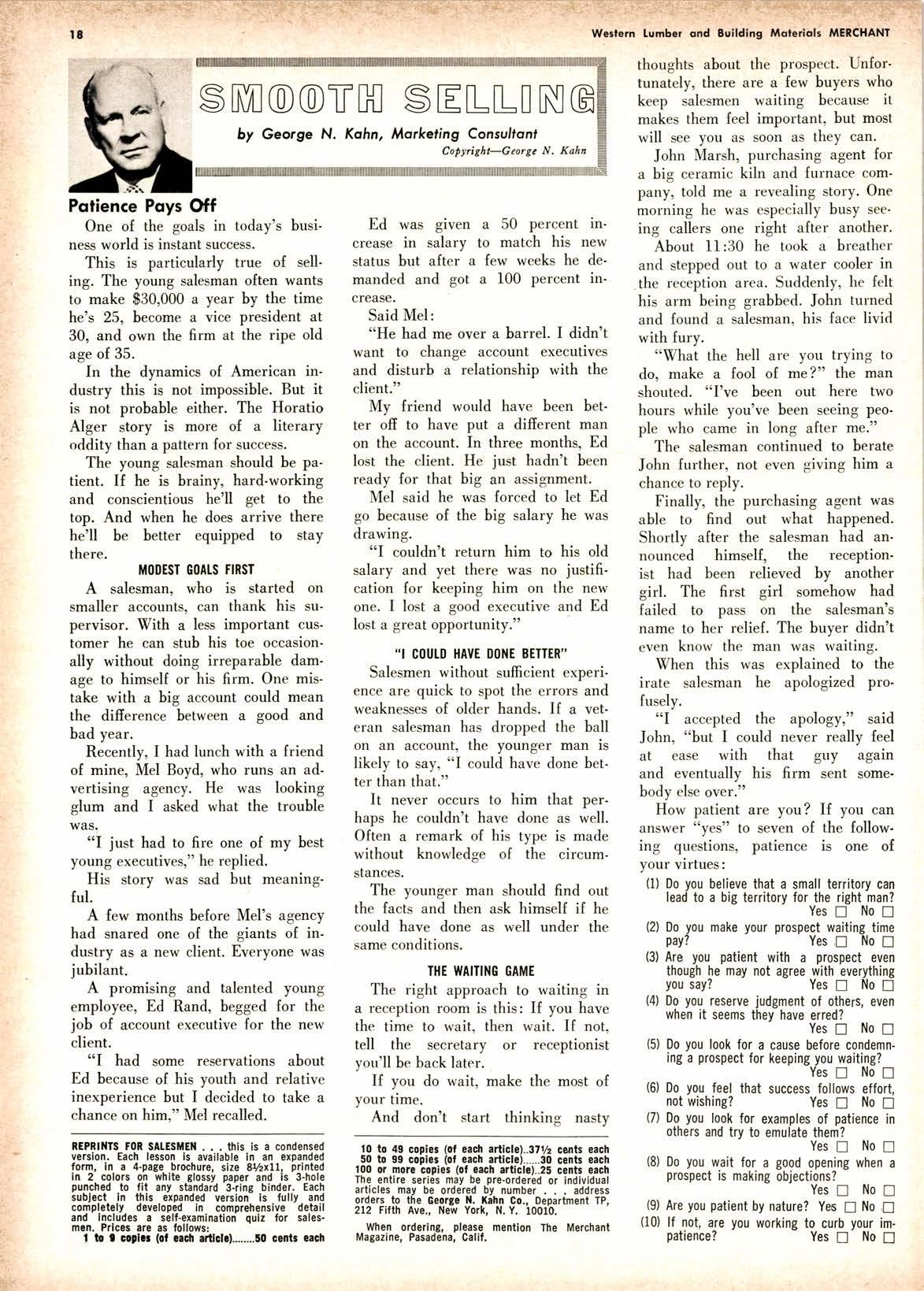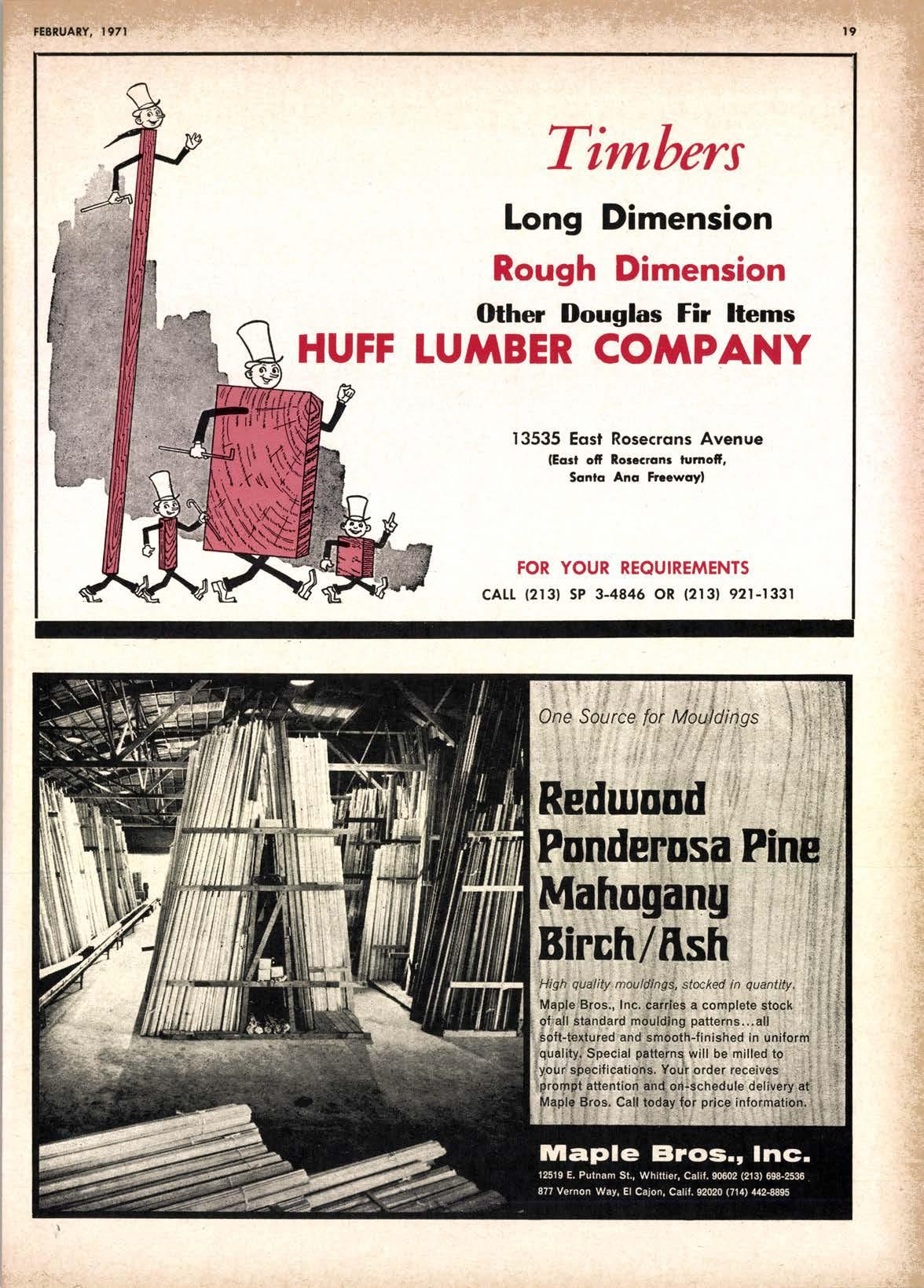
4 minute read
SNN@@TH SELLIN
by George N. Kohn, Morketing Consuftonl Co|rright-Gcorgc N. Kahn
Pqlience Poys Off
One of the goals in today's business world is instant success.
This is particularly true of sell' ing. The young salesman often wants to make $30,000 a year by the time he's 25, become a vice president at 30, and own the firm at the ripe old age of 35.
In the dynamics of American industry this is not impossible. But it is not probable either. The Horatio Alger story is more of a literary oddity than a pattern for success.
The young salesman should be patient. If he is brainy, hard-working and conscientious he'll get to the top. And when he does arrive there he'll be better equipped to stay there.
M|IIIEST G|IATS FIRST
A salesman, who is started on smaller accounts, can thank his supervisor. With a less important customer he can stub his toe occasionally without doing irreparable damage to himself or his firm. One mistake with a big account could mean the difierence between a good and bad year.
Recently, I had lunch with a friend of mine, Mel Boyd, who runs an advertising agency. He was looking glum and I asked what the trouble was.
"I just had to fire one of my best young executives," he replied.
His story was sad but meaningful.
A few months before Mel's agency had snared one of the giants of industry as a new client. Everyone was jubilant.
A promising and talented young employee, Ed Rand, begged for the job of account executive for the new client.
'oI had some reservations about Ed because of his youth and relative inexperience but I decided to take a chance on him," Mel recalled.
nEPRlllIs Fon SAtESilEll , $is is a condensed version. Each lesson is available in an expanded form, In a 4-page brochute, slze 814111, prlnted in 2 colors on white glossy paper and ls 3-hole punchod to fit any standard 3-ring binder. Each sublect In thls expanded version ls fully and compl€toly doyeloped In conptehensive detail and l!c!udes a self-examlnation qulz for salesmcn, Prlcos are as lollorYs: b
Ed was given a 50 percent increase in salary to match his new status but a{ter a {ew weeks he demanded and got a 100 percent increase.
Said Mel: o'He had me over a barrel. I didn't want to change account executives and disturb a relationship with the client."
My friend would have been better ofi to have put a difierent man on the account. In three months, Ed lost the client. He just hadn't been ready for that big an assignment.
Mel said he was forced to let Ed go because of the big salary he was drawing.
"I couldn't return him to his old salary and yet there was no justification for keeping him on the new one. I lost a good executive and Ed lost a great opportunity."
"I C()UID HAYE D()NE BETITR"
Salesmen without sufficient experience are.quick to spot the errors and weaknesses of older hands. If a veteran salesman has dropped the ball on an account, the younger man is likely to sayo "I could have done better than that."
It never occurs to him that perhaps he couldn't have done as well. Often a remark of his type is made without knowledge of the circumstances.
The younger man should find out the facts and then ask himself if he could have done as well under the same conditions,
IHE WAITI}IG GAME
The right approach to waiting in a reception room is this: If you have the time to wait, then wait. If not, tell the secretary or receptionist you'll be back later.
If you do wait, make the most of your time.
And don't start thinking nasty thoughts about the prospect. Unfor' tunately, there are a few buyers who keep salesmen waiting because it makes them feel important, but most will see you as soon as they can. ooWhat the hell are you trying to do, make a fool of me?" the man shouted. "I've been out here two hours while you've been seeing people who came in long after me."
John Marsh, purchasing agent for a big ceramic kiln and {urnace company, told me a revealing story. One morning he was especially busy see' ing callers one right after another.
About II:30 he took a bleather and stepped out to a water cooler in the reception area. Suddenly, he felt his arm being grabbed. John turned and found a salesmano his face livid with fury.
The salesman continued to berate John further, not even giving him a chance to reply.
Finally, the purchasing agent was able to find out what happened' Shortly after the salesman had announced himself, the receptionist had been relieved by another girl. The first girl somehow had failed to pass on the salesman's name to her relief. The buyer didnot even know the man was waiting.
When this was explained to the irate salesman he apologized profusely.
'oI accepted the apology," said John, "but I could never really feel at ease with that guy again and eventually his firm sent somebody else over."
How patient are you? If you can answer "yes" to seven of the followi.g questions, patience is one of your virtues:
(l) Do you believe that a small territory can lead to a big territory "r,r.rXr ffnh1rg
(2) Do you make your prospect waiting time pay? Yes ,n No D
(3) Are you patient with a prospect even though he may not agree with everything you say? Yes I No D
(4) Do you reserve judgment of others, even when it seems they have erred? No !
(5) Do you look for a cause before condemning a prospect for keepineloufl.,r',[ft.
(6) Do you feel that success follows effort, not wishing? Yesn NoD
(il Do you look for examples of patience in others and try to emulate them? Yes! Non
(8) Do you wait for a good opening when a prospect is making obir.,,fJrrtl No !
(9) Are you patient by nature? Yes n No .tr
(10) lf not, are you working to curb your im. patience? Yes D No !











